The Bundesliga - a vision of the Premier League future?
May 2, 2012Although this site takes a generally positive view towards UEFA's Financial Fair Play rules, it is important to appreciate that the changes carry some risks for the Premier League.
Many journalists, fans and people working in football are concerned that UEFA's Financial Fair Play rules will reduce the excitement of the Premier League and that the larger clubs will dominate the domestic competitions. Martin Samuel from The Mail is one of the more outspoken critics of the rules, but he is certainly not alone in his concern about the effects of FFP. In future, wealthy owner will not be allowed to spend their own money in the pursuit of success - even if an owner is prepared to put funds into the club via equity (as Sheikh Mansour does at City), they will simply not be allowed spend to achieve their ambitions for the club. Many would agree that City and Chelsea have added welcome excitement and variety to the Premier League - both clubs are funded by wealthy owners. And it is not just the uber-wealthy clubs that will be impacted by the rules - in future clubs will not be able to 'speculate to accumulate' and won't be able to spend much more than they receive to 'chase the dream'. Swansea and Norwich have both made fairly big financial losses in recent years - other clubs will not be able to follow the same approach. The main worry is probably that the rich clubs will get richer and that the smaller clubs will not be able to break into the top tier - they will lose their top players to the bigger clubs and consequently the Premier League will become stupefying dull, consistently dominated by a small number of very wealthy clubs that continue to vacuum up the commercial benefits of their success.
This view of the football is certainly both powerful and worrying. However it could be argued that the post-FFP world is already with is - we can see how FFP will affect the Premier League simply by looking at the Bundesliga.
The Bundesliga already operates in a Financial Fair Play environment. The majority of German clubs break-even and there is political pressure used by the Bundesliga to discourage overspending. Other than Wolfsburg and Levekeusen the clubs operate on a model whereby the fans own 51% of each Bundeliga club. Consequently, there is no scope for wealthy owners to inject huge funds into buy success - the wealthy benefactor model doesn't operate in Germany. The Bundesliga is dominated by Bayern Munich, who occupy a similar historic position as Manchester United. As in the Premier League, the large clubs usually take part in the Champions League most seasons and enjoy the benefits of the Champions League money. So, if the nightmare scenario of the post FFP future is correct, we would expect the Bundesliga to be significantly more dull and predictable compared to the Premier League. However, the German reality is actually somewhat different.
The attached graphs show how the top 10 clubs in 2002 have fared in the succeeding years 10 years.
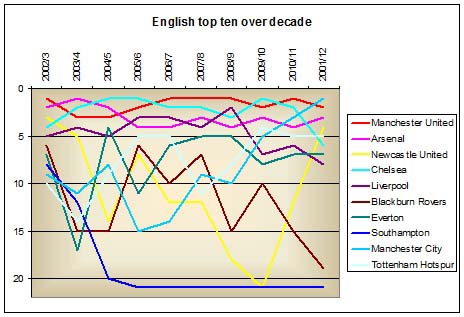
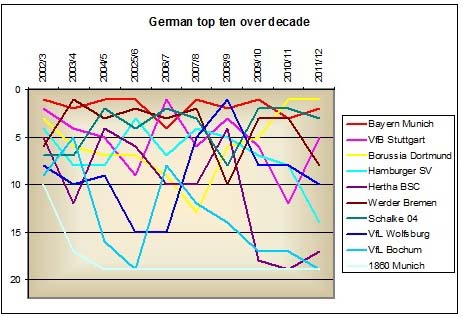
Note: the 2011/12 positions are as at today's date and could well change a little by the end of the season. To keep the scale comparable, relegated clubs are shown bumping along the bottom of the graph, rather than in their actual league position.
The more 'chaos' and 'noise' in the graphs, the more variety in League position. There is clearly greater variety in clubs' league position in Germany. The position at the top of the chart is also noticeably more unsettled in Germany. Obviously Bayern dominate the Bundesliga, but, to a somewhat lesser extent than Manchester United. There also hasn't been the same dominance of 4 or 5 big clubs in Germany as there have been in Premier League. In terms of variety, the Premier League is actually rather dull by comparison (even allowing for the performances of Newcastle (£140m in debt to Mike Ashley) and Manchester City.
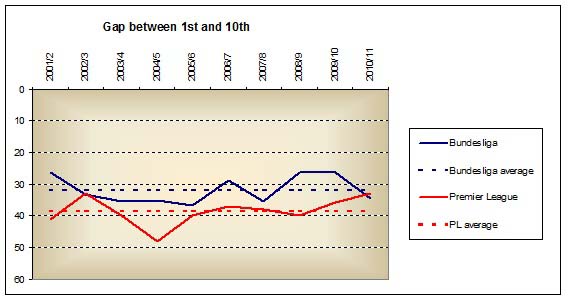
Note, German points are adjusted for the 4 fewer games in the Bundesliga.
Looking at the League positions of the FA Cup winners and the German cup (the DFB-Pokal), we see that the German cup again provides more variety than in England (especially amongst the winners). Whereas only one club outside the top 4 has won the FA Cup in England (debt-fuelled Pompey), 3 clubs have achieved this result in Germany. The runners-up have achieved broadly similar league positions in both Leagues.
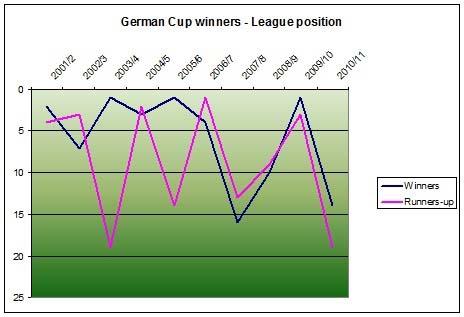
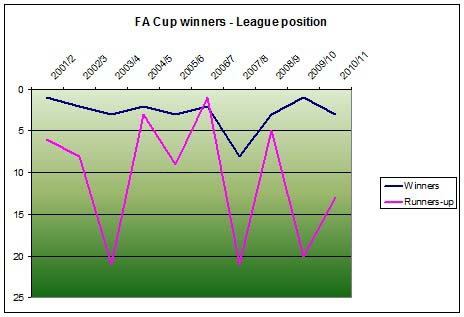
Although this presents a more comforting view of the future, there is one notable differences between the two national leagues; debt. When FFP is fully up and running in the Premier League, a large number of teams will have significant historic debt issues to contend with - this simply isn't the case in Germany. There is a risk that the cost of servicing debt may restrict clubs ability to compete and generate even less variety of league position we currently have in the Premier League.
Posted by Ed Thompson.

